This is one of the most fascinating places in Alto Adige, where time seems to have stopped in an oneiric dimension. The whole hotel is made of unique rooms, recovered from carefully renovated old stubes. There are two restaurants: this is the smaller and more elegant one, with only 4 small rooms, serving 25 people with doilies, flowers of rare beauty, small pinecones and ribbons. There’s more: a more reserved and exclusive corner, in the most ancient stube, decorated with brocade fabric and candles, resulting in a uniquely refined atmosphere. Come as a couple to dream hand in hand, but also to taste the dishes that the chefs make with great attention, under the vigil eye of Michil Costa, the real creator of this delicacy. The kitchen is elegant without wanting to seem overly so, the flavours are strong, the ambience is precious, rooted to the territory with some small transgressions. There’s Ravioli of black polenta with formaggio grigio on stewed cabbage, Risotto with wild spinach, chanterelle mushrooms and sweetbreads, Suckling pig jowl bacon with raw vegetable salad and Catalan sauce. Don’t miss the petit fours at the end and of course a visit to the famous wine cellar.
Luigi Cremona wrote these words back in 2008, in the first edition of the Guida Identità Golose. He was talking about La Stüa de Michil, which was already famous, starred since 2003, with a great master like Arturo Spicocchi in the kitchen. And it wasn’t only the food: Stüa made you (and makes you) dream because it’s inside La Perla, an iconic fine hotel, founded in 1954 when Ernesto Costa and his Villa Kostner got the licence to rent some furnished apartments. With his father and uncle he put his talent and stubbornness to use and opened the hotel which, in 1956, was named La Perla. "A few years later I got married with Anni adding new energy and creativity: flowers and curtains, rooms and a great cordial relationship with the guests. At La Perla there was place for everything: mountains, relax, family and dancing at Club 44. Ernesto and Anni were blessed by the arrival of three sons: Michil, Mathias and Maximilian", says the official biography. A place that has made the history of hospitality in South Tyrol. An emblem, a point of reference, to this day. A model of hospitality that still has much to teach.
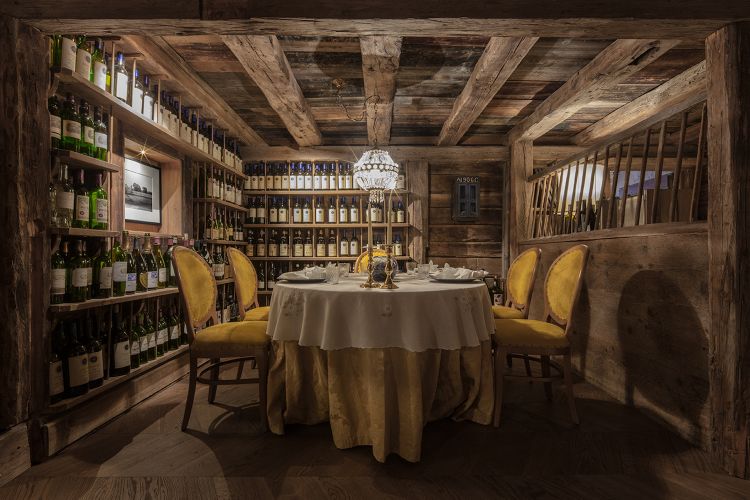
All this
excursus to give some context to the sense of deep change, necessary after two decades (19 years to be precise) of gastronomic laurels, first with
Spicocchi and then with
Nicola Laera, who took over in 2014. It was time for a change. And patron
Michil Costa didn’t need to be asked twice. His choice was truly outside the box.
Which choice? To tell you about it, we’ll tell you another story that seems distant but is in fact closely connected. January 2020: Simone Cantafio returns to Italy from Japan for a holiday. Since 2015, he’s been the chef at the restaurant of an icon like Michel Bras in Toya, Japan (the best in the world according to Opinionated About Dining Classical & Heritage 2016): an Italian talent long at work in kitchens abroad. Born in 1986, he has trained with Carlo Cracco, Gualtiero Marchesi (he was one of his last pupils), Georges Blanc and Michel Bras. Cantafio was born in Rho, near Milan, but is originally from Calabria: and he’s in Calabria when the pandemic explodes. Bad luck: he had just received confirmation of a new project, the imminent opening of a restaurant – not far from Tokyo – in which the sign will show both the names of Bras and Cantafio, side by side. It could have been a personal apotheosis, the proof of a fast-growing career for the young man
Sliding doors. Covid stops everything, blocks Simone in Italy, the Bras-Cantafio in Japan is postponed to a date to be defined (the idea is not yet dead though...). Michil Costa then comes into the picture, as at the same time, as we’ve seen, he’s in need of a change at his Stüa. We imagine their dialogue: «Simone, how about you come here?». «Alright. I’m coming».
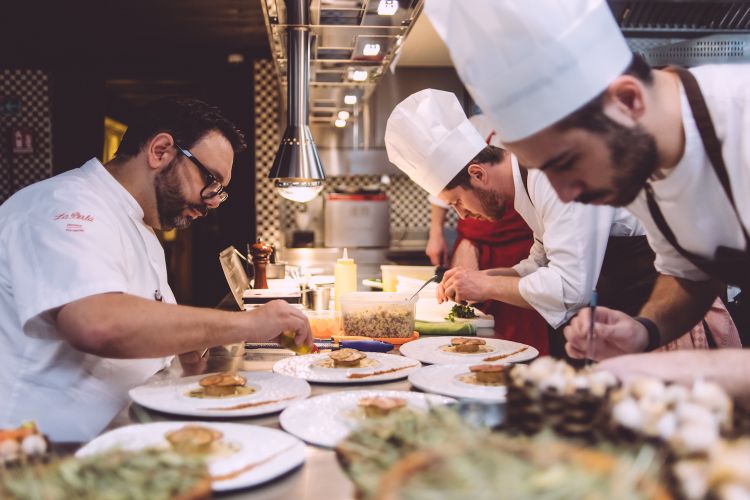
Cantafio at work. He has a team of very trusted people. The sous is Luca Tegon, previous sous of Mauro Colagreco at Mirazur, though Cantafio had already met him in the days of Marchesi, when they were in their late teens
Cantafio at La Stüa de Michil is something weird, hence extremely fertile. He mixes Japan (his wife is Japanese) with Peru, France with Mexico, Spain with the Mediterranean, thus guiding culinary expressions into his personal experience, his know how, the influences he’s absorbed in his short (he’s so young) career. In a South Tyrol dominated – which is good – by the concept of Cook the Mountain, he expresses something different in terms of concept. Comparisons should not be made: he does something different, which must be assessed by itself. And before anything, we love the idea that he goes beyond models we appreciate without any doubt, in fact we find extraordinary. But we’re intrigued by what’s different.
He’s excellent, technically above the usual points of reference, «I got used to base my work on nature, on herbs. It’s my philosophy in the kitchen, which I’m trying to bring here too». All this with Japanese rigour.
He can harmonise flavours like few others. He’s already extraordinary. We believe he still needs to sediment his essence on the infamous territory («Which is pure fashion, now. I have a vegetable garden in Marebbe, a 30-minute drive, for those vegetables that are extraordinary here. And one near Lamezia Terme, in Calabria, for the vegetables that are extraordinary over there. It’s nature that chooses, that’s what Michel Bras taught me». Around 40 suppliers, from North to South), hence avoiding the almost psychological need of having to show something which is typical of those who try to restate at home the accomplishments they earned abroad. Simone has plenty of talent, he's a champion and he shows this right away. In terms of stars, a guarantee.
However – which is something more important – destiny has brought back to Italy a talent, after six years in France and five in Japan: now he will show even here that he’s a real champion.
«I cook what I am. I cook what I have experienced», he says.
And here is our dinner, with photos from Tanio Liotta.
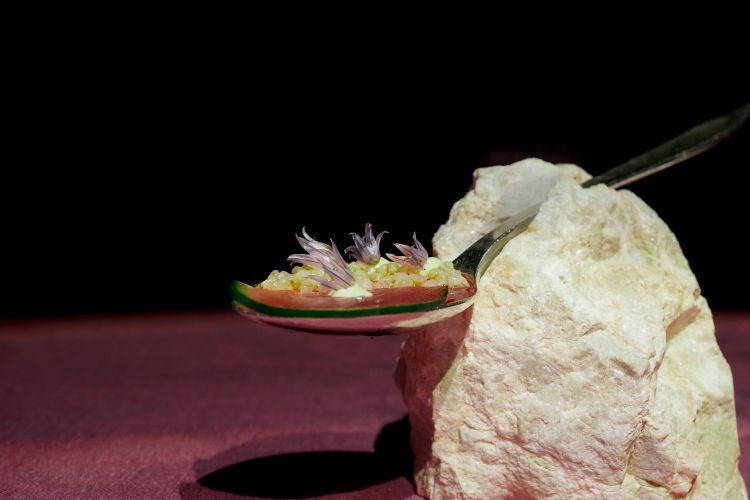
Gel of vegetation water from a summer salad, smoked bulgur, crunchy cucumber with alcohol-free gin
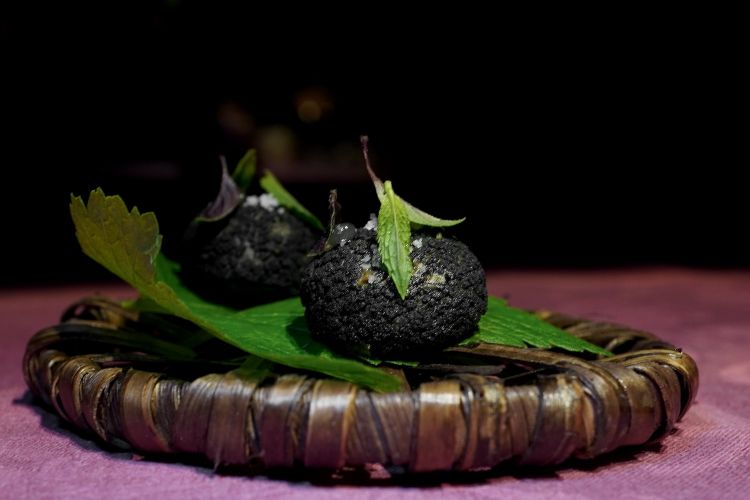
Croquelin of smoked aubergine peel filled with caponata, with mint and basil
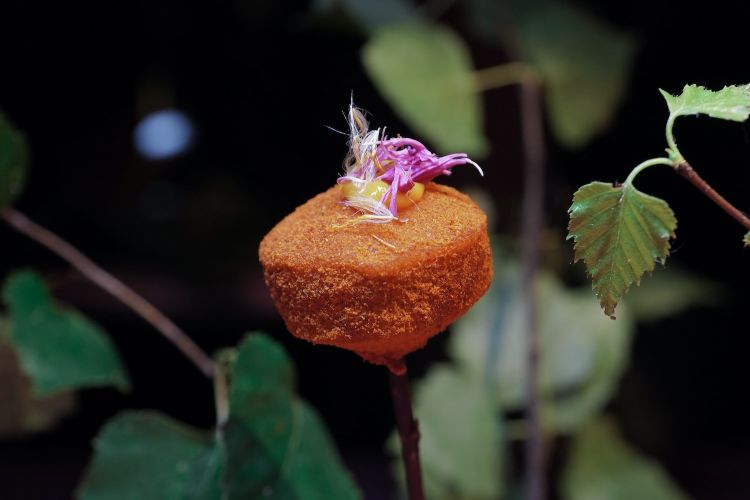
Krapfen of potatoes, goat cheese and powdered pepper
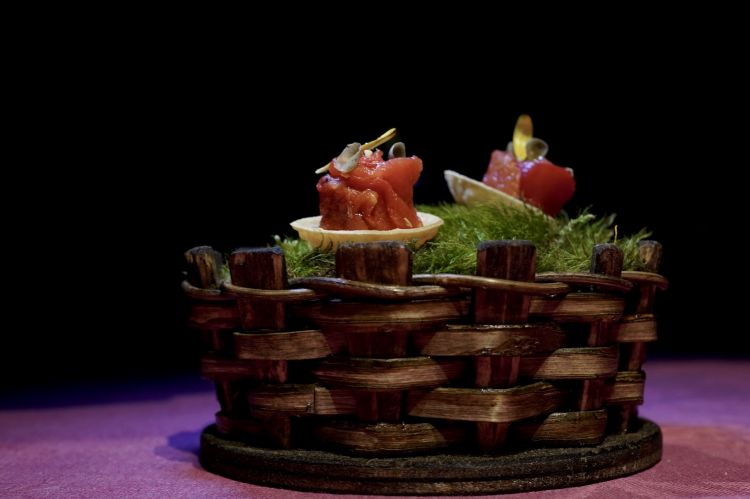
Tartlet with anchoiade sauce, candied tomato, caper from Salina and lemon
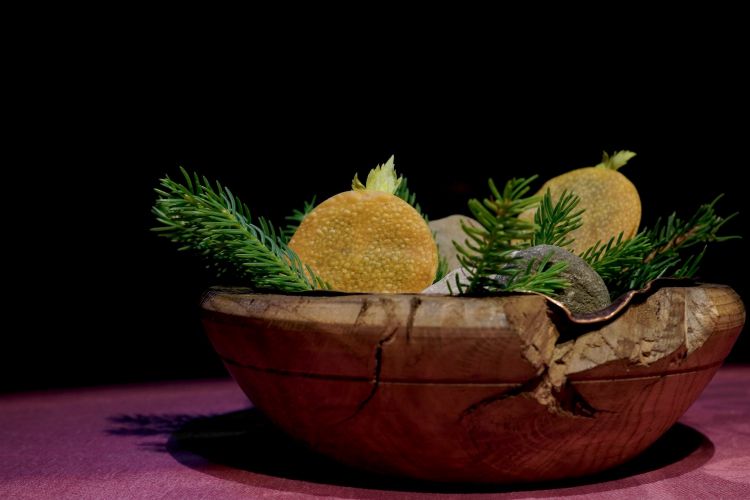
Chips of chickpeas, hummus of lentils, Ioppolo soppressata
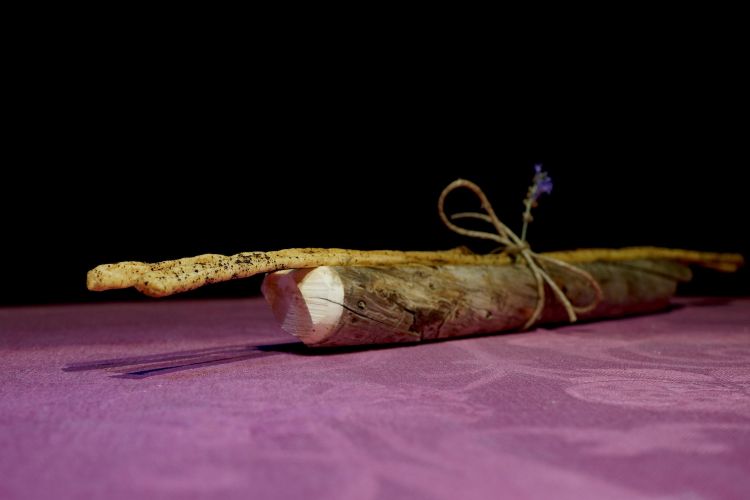
Breadstick with speck and cheese from maso Pretzhof, covered with powdered porcini
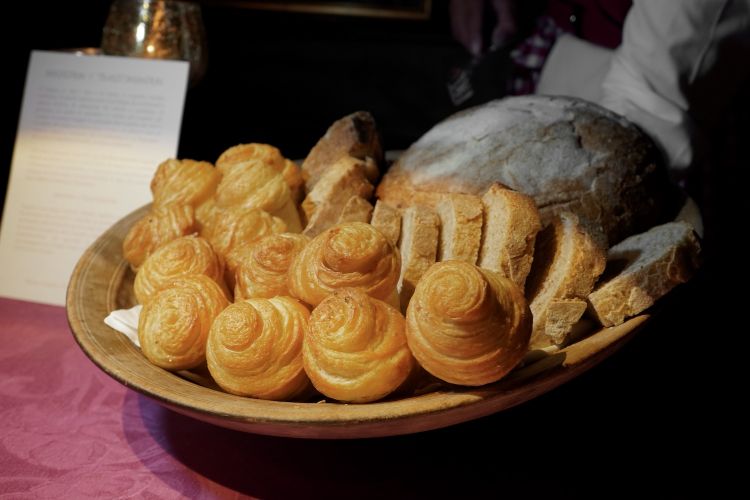
Bread (crispy, powdered with polenta, casereccio and flaky with salt) and butter – marvellous – from Marebbe, made by a family of farmers with five cows and lots of passion
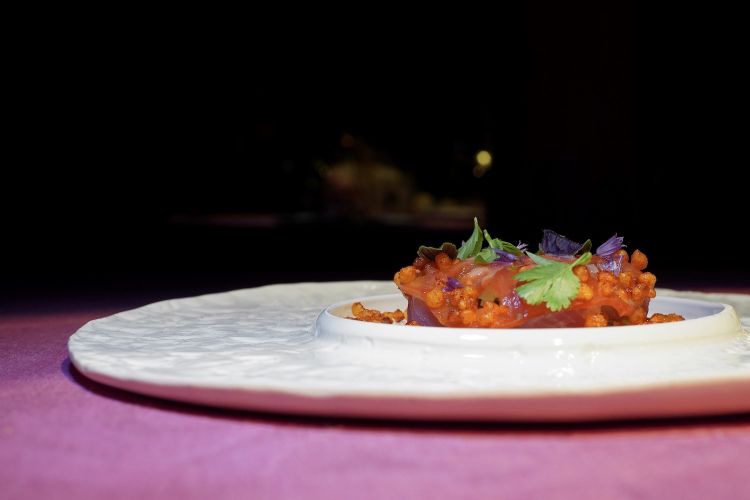
Beefsteak tomato in balls of crispy tempura and in carpaccio, ceviche of amberjack, jus of buttermilk from maso di San Vigilio instead of the leche de tigre. The journey, as we’ll see, is marked by vegetables, «not to follow what’s trendy, but as a result of my experience with Bras»
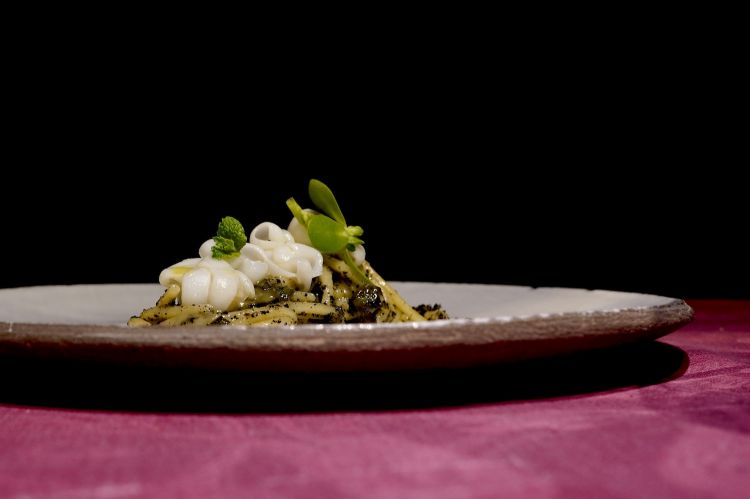
Portulaca with sour salmoriglio, spaghettoni mixed with pil pil of grilled squid, con grilled squid tagliatelle and bread with squid ink
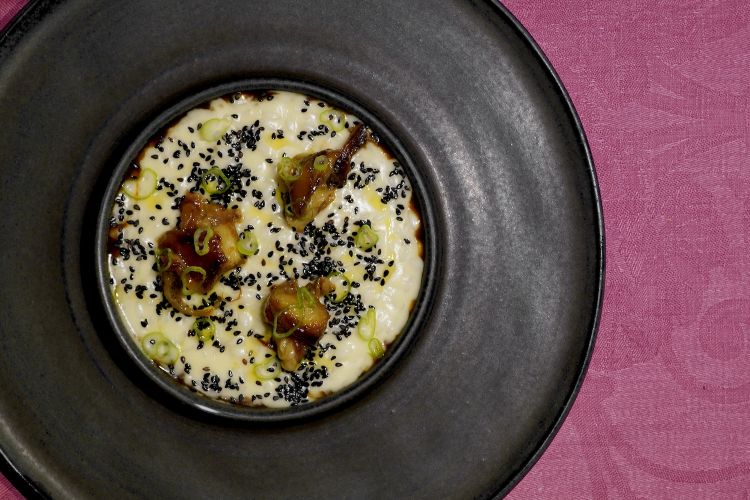
Courgette nasu dengaku, risotto mixed with sweet mountain leeks, jus of duck & yuzu kosho, toasted black sesame. The nasu dengaku aubergines (cut in half and glazed with soy sauce, mirin and sugar), recall the typical Japanese recipe of dengaku, an ancient festival takes took place when rice was sown. Yuzu kosho is a Japanese sauce made with chilli pepper, salt and yuzu peel
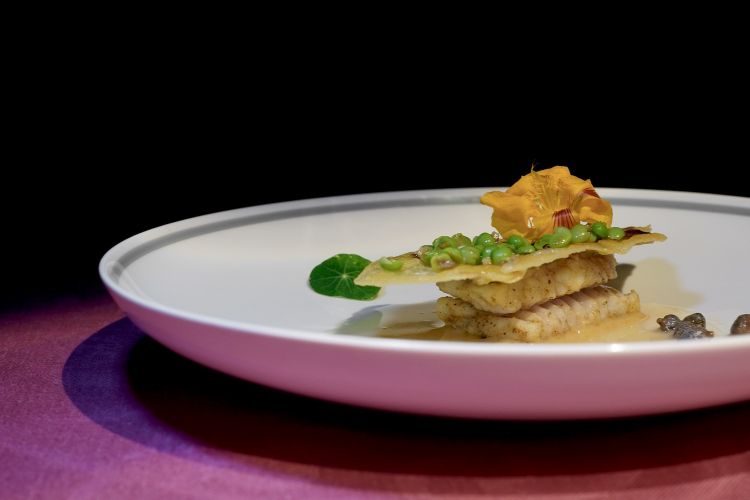
Cabbage, beefsteak tomato wrapped in capers and peas, ray wings Vadouvan meuniere deglazed with limoncello
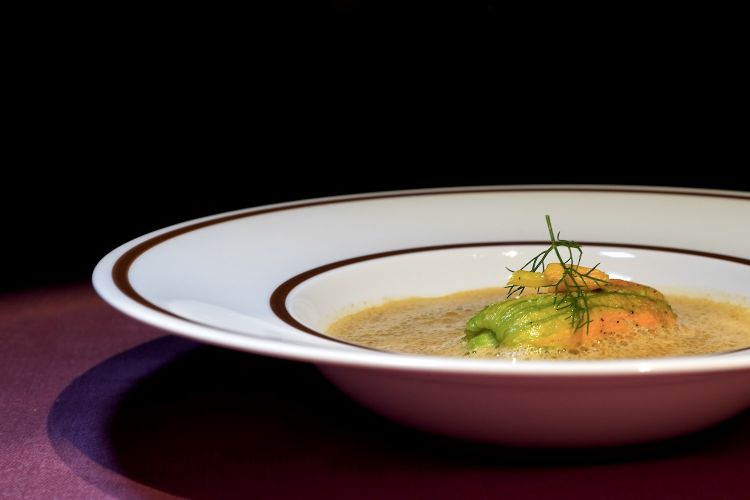
Courgette flower filled with grilled corn and porco cinturello from Alfredo Angeli, Italian style mole sauce (that is to say sweet 'nduja, peperone crusco, chocolate, almonds)
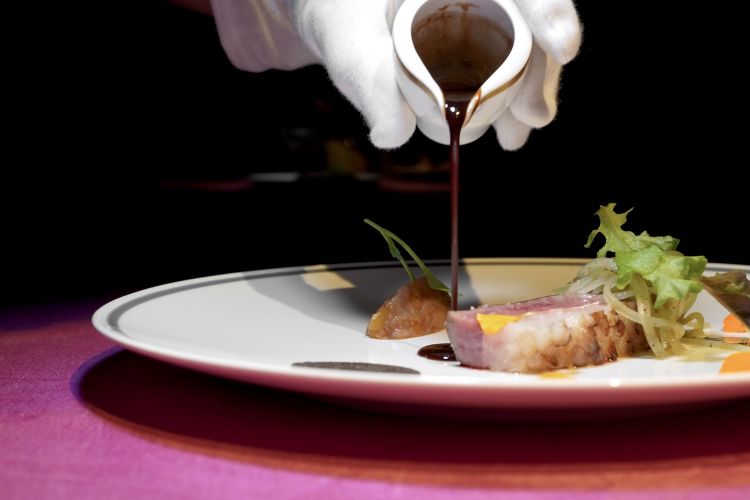
Lettuce asparagus, vinaigrette with black truffle from Calabria, chargrilled lamb "with glasses" from Val di Funes, brunoise of cold and hot peaches, red wine sauce
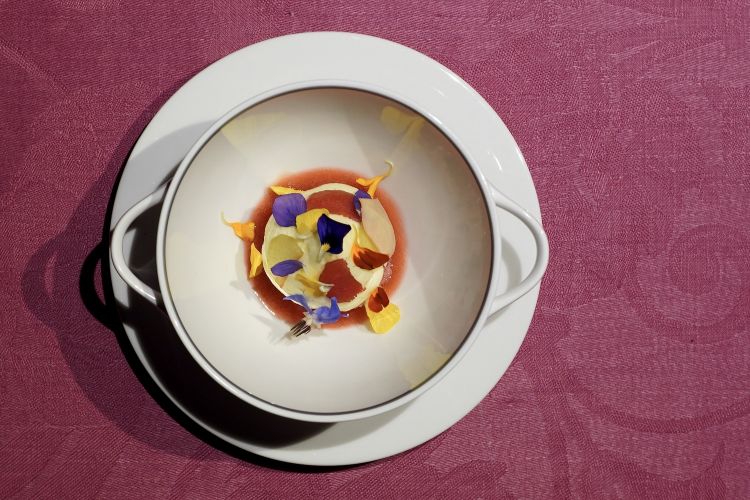
Poached rhubarb in camomile, mousse of tropezienne, coulis all'ancienne, that is to say red fruits. The tarte tropezienne is a soft cake made with pan brioche filled with custard, butter cream and Chantilly cream
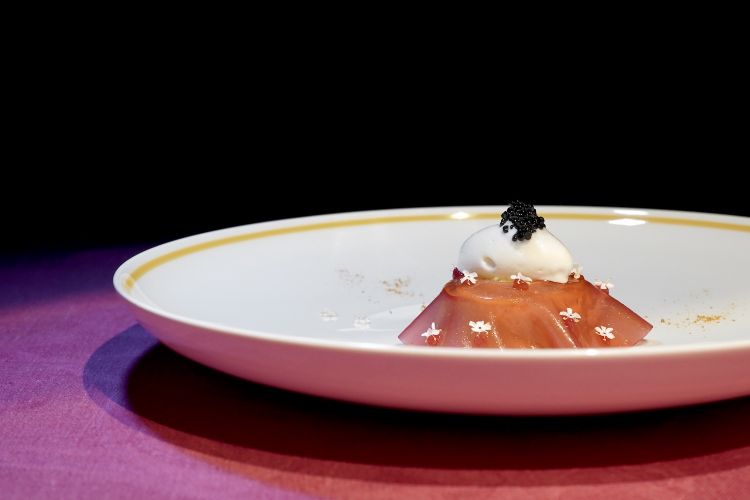
Apricot in a warm clafloutis, gel of rose syrup from Vipiteno, frozen cream of almonds from Noto, caviar. Dedicated to Corrado Assenza
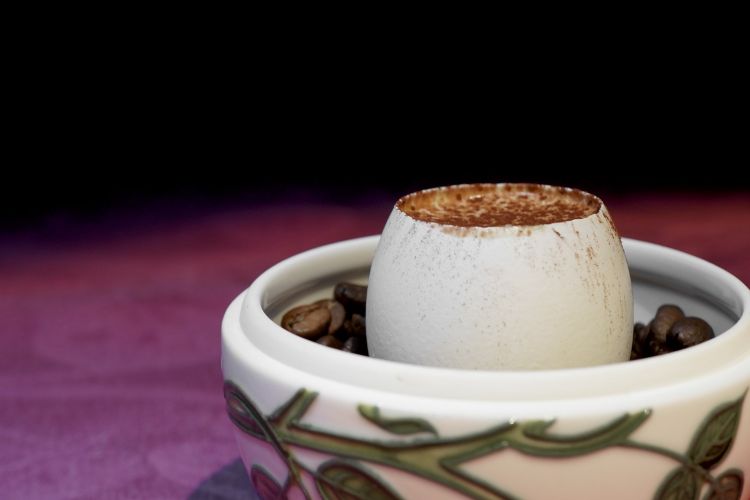
Sweet finale: a classic Tiramisù...
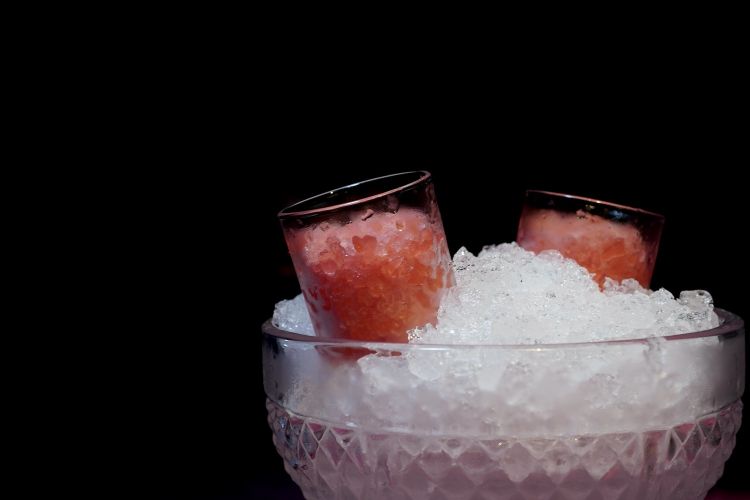
Watermelon Granita, champagne and tabasco
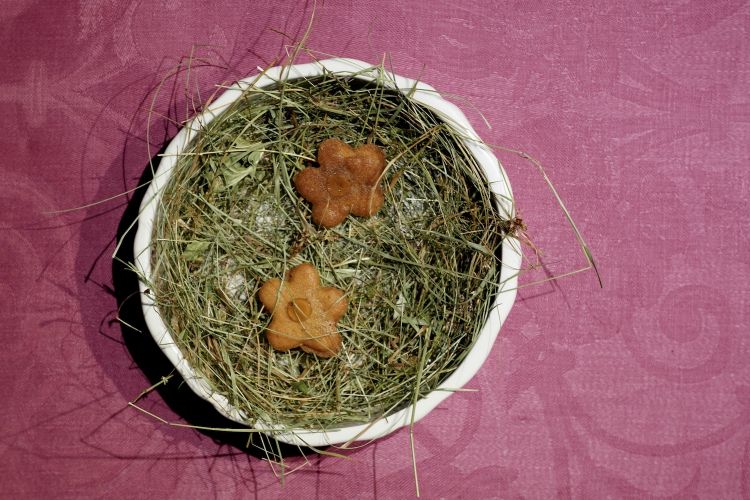
Biscuits with toffee cream (with soy sauce instead of the butter)